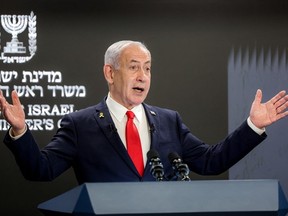World
Israeli Military Leaders Criticize Netanyahu’s Gaza Strategy

The ongoing military conflict in Gaza has drawn sharp criticism from Israeli military leaders, particularly regarding Prime Minister Benjamin Netanyahu‘s strategy to re-occupy Gaza City. This criticism comes from Eyal Zamir, the current chief of the general staff of the Israel Defense Forces (IDF), who has expressed concerns that such a move could overextend an already strained military, currently engaged in a conflict that has lasted more than 23 months.
Zamir’s objections were met with accusations from Netanyahu’s son, who suggested that Zamir’s stance resembled a coup attempt. Nonetheless, Zamir argued that re-occupying Gaza City is unnecessary for Israel’s security. He also highlighted the potential risks to approximately 20 hostages believed to be alive, who may be endangered by an escalation of military actions.
Former Officials Urge Change in Strategy
In a broader call for a reassessment of Israel’s military approach, an open letter signed by over 600 former military and security officials, including leaders from Mossad and Shin Bet, urged U.S. President Donald Trump to pressure Netanyahu to conclude the ongoing war. Among the signatories is Ami Ayalon, a member of Israel’s opposition Labour party and a former head of Shin Bet from 1996 to 2000. In a video accompanying the letter, Ayalon stated, “At first this was a just war, a defensive war, but when we achieved all military objectives this war ceased to be a just war.” He warned that the current trajectory threatens Israel’s security and national identity.
Historically, Israeli military and security leaders have often criticized their own government’s policies, especially after retirement. In the documentary The Gatekeepers, directed by Dror Moreh, former heads of Shin Bet described their experiences in combating terrorism. They acknowledged the use of targeted assassinations and mass arrests that, while aimed at protecting Israeli citizens, resulted in the loss of innocent Palestinian lives.
Long-Term Security Concerns
These former officials have raised alarms about the long-term security of Israel, attributing failures to the government’s inability to negotiate an independent Palestinian state immediately following the 1967 war. They argue that while tactical responses to terrorism have been prioritized, the absence of a comprehensive strategy has perpetuated the conflict. Criticism has also been directed towards the expansion of settlements in the West Bank, which many believe hinders peace efforts.
The assassination of former Prime Minister Yitzhak Rabin in 1995 by Yigal Amir, a radical Orthodox Jew, is cited by Ayalon and others as a pivotal moment that undermined peace talks. They contend this act, incited by radical elements within the Likud party, marked a significant turning point, leading to a series of missed opportunities for peace.
The late Avraham Shalom, who headed Shin Bet from 1980 to 1986, expressed concern over the moral implications of the occupation. He noted that the occupation has not only harmed Palestinians but has also had detrimental effects on Israeli society. “The future is bleak … where does it lead? To a change in the people’s character,” he remarked.
Ayalon’s reflections on the conflict suggest a critical view of military victories that do not address the underlying issues. He articulated a reality where Israel may win battles but continues to lose the broader conflict. “Victory doesn’t dictate that we have to conquer Gaza or Ramallah or Nablus or Hebron,” Ayalon said, emphasizing that such actions do not guarantee security.
As the situation evolves, the discourse around military strategy and peace negotiations remains a crucial element in the quest for stability in the region. The voices of former military leaders reflect a growing sentiment that a reevaluation of tactics and a move towards diplomacy may be necessary for a sustainable future for both Israelis and Palestinians.
-

 Science4 months ago
Science4 months agoToyoake City Proposes Daily Two-Hour Smartphone Use Limit
-

 Top Stories4 months ago
Top Stories4 months agoPedestrian Fatally Injured in Esquimalt Collision on August 14
-

 Health4 months ago
Health4 months agoB.C. Review Reveals Urgent Need for Rare-Disease Drug Reforms
-

 Technology4 months ago
Technology4 months agoDark Adventure Game “Bye Sweet Carole” Set for October Release
-

 World4 months ago
World4 months agoJimmy Lai’s Defense Challenges Charges Under National Security Law
-

 Lifestyle4 months ago
Lifestyle4 months agoVictoria’s Pop-Up Shop Shines Light on B.C.’s Wolf Cull
-

 Technology4 months ago
Technology4 months agoKonami Revives Iconic Metal Gear Solid Delta Ahead of Release
-

 Technology4 months ago
Technology4 months agoApple Expands Self-Service Repair Program to Canada
-

 Technology4 months ago
Technology4 months agoSnapmaker U1 Color 3D Printer Redefines Speed and Sustainability
-

 Technology4 months ago
Technology4 months agoAION Folding Knife: Redefining EDC Design with Premium Materials
-

 Technology4 months ago
Technology4 months agoSolve Today’s Wordle Challenge: Hints and Answer for August 19
-

 Business4 months ago
Business4 months agoGordon Murray Automotive Unveils S1 LM and Le Mans GTR at Monterey









